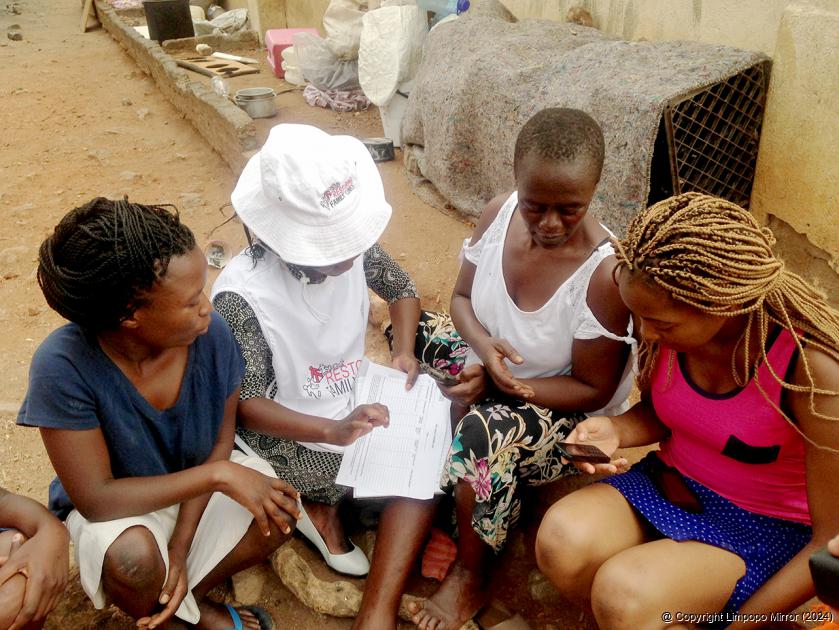

ADVERTISEMENT:

A SARCS official assisting Restoring Family Link beneficiaries at a shelter in Musina. Photo supplied
Red Cross launches programme to restore migrants’ family links in Musina area
A special programme to reunite refugees with their family members was launched in Musina by the SA Red Cross Society (SARCS) three months ago. Since July, the Restoring Family Links (RFL) programme has assisted more than 100 vulnerable migrants to make contact with their families.
According to SARCS communication manager Mrs Lungile Khambule, the migrants arrive at the border post for a variety of reasons, which include fleeing from armed conflict and natural disasters. The RFL project aims to assist these people to make contact with their family members by granting them access to, for instance, a telephone system.
“A presentation was done to stakeholders and organizations such as IOM, Department of Home Affairs, SAPS, DSD, UNCHR, and Vhembe Disaster Management to disseminate principles of the Red Cross and to introduce the project to other partners,” said Khambule.
The target groups are mainly found at shelters, the border post and the offices of the Department of Home Affairs. Official statistics show that over 300 000 asylum seekers and refugees migrated to South Africa during the year 2010/11.
According to SARCS, “most asylum applications lodged with the Department of Home Affairs are from Burundi, Ethiopia, Eritrea, DRC, Rwanda, Somalia and Zimbabwe, but there are also some from citizens of Malawi, Zambia and others from Asian countries. These numbers are compounded by the influx of economic migrants from our neighbouring countries.”
The migrants are allowed to work and to avail themselves of basic social services, but in practice it is difficult for them to do so asa result of difficulties experienced when attempting to obtain documentation.
“Competition between refugees and South African nationals for jobs, housing, business opportunities and social services has raised tensions, to an extent of heightened xenophobic attitudes among some in the local community,” said Khambule.
Many members of the South African communities are also not accepting the presence of the migrants and, as a result, may influence the project.
Khambule urged community members to support the endeavour and, most importantly, utilize the service or advise others around them who are in need of this service that SARCS is available to assist.
Date:09 October 2016
By: Thendo Savhasa
Thendo Savhasa (26) has always loved reading and writing from a very young age. A resident of Shanzha village in the Nzhelele area, she is currently busy with her a national diploma in journalism from the Tswane University of Technology (TUT). Thendo joined the Limpopo Mirror team as a journalism intern in February 2016.
Read: 1061

ADVERTISEMENT

ADVERTISEMENT:

ADVERTISEMENT:

Recent Articles
-

Napoli beat Blue Birds to lift Lumveleni trophy
26 April 2024 By Frank Mavhungu -

Vhembe artists wants to unite to revive Tshivenda music
26 April 2024 By Elmon Tshikhudo -

Three boys in jail after man is stabbed at tavern
26 April 2024 By Kaizer Nengovhela -

Bloodshed continues in ongoing gang war
26 April 2024 By Victor Mukwevho -

Yahya selected for SA over-50s World Cup
26 April 2024 By Anton van Zyl

ADVERTISEMENT

Popular Articles
-

Leopards’ top striker dreams of playing for Kaizer Chiefs
22 March 2024 By Frank Mavhungu -

Well-known inventor, Prof Mulalo Doyoyo, dies
14 March 2024 By Victor Mukwevho -

Lesley Manyathela stadium remains a 'white elephant' to local clubs
23 March 2024 By Kaizer Nengovhela -

Prophet Muritho's nightmare continues
19 April 2024 By Elmon Tshikhudo -

Park development leaves residents puzzled
22 March 2024 By Andries van Zyl -

Many questions as man shoot himself in the head
15 March 2024 By Elmon Tshikhudo -

Choir leader shot twice during Easter service
05 April 2024 By Victor Mukwevho

